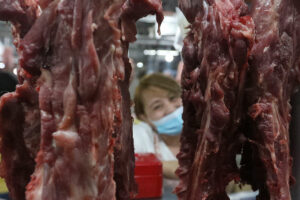




Policy Rate Updates: BSP outlook — cloudy with a chance of rate cut
 DOWNLOAD
DOWNLOAD

January Economic Update: Growth slows, prices rise
 DOWNLOAD
DOWNLOAD

Inflation Update: Up, up, and away?
 DOWNLOAD
DOWNLOAD


Marcos extends tariff cuts for 1 year

PRESIDENT Ferdinand R. Marcos, Jr. has given the go signal to extend the reduction in tariffs on pork, corn, rice and coal for at least one year, amid supply shortages and high inflation, Malacañang said.
The Palace said in a statement that Mr. Marcos approved the recommendation of the National Economic and Development Authority (NEDA) Board to extend Executive Order (EO) No. 171, which reduced Most Favored Nation (MFN) tariff rates on swine meat, corn, rice, and coal, until Dec. 31, 2023.
A copy of the new EO was not released by Malacañang.
EO 171, which was signed by then-President Rodrigo R. Duterte in May, had extended the lower tariffs on pork and rice, as well as cut duties on corn and coal but only until end-2022.
The Palace said the order was aimed at mitigating inflationary pressures arising from the Ukraine-Russia war, addressing supply issues and reducing prices of key commodities.
Tariff rates on pork for in-quota and out-quota shipments will be kept at a reduced rate of 15% (from 30%) and 25% (from 40%). Rice tariffs will be retained at a lower rate of 35% for in-quota and 50% for out-quota.
Corn tariff rates will also be reduced to 5% for in-quota imports (from 35%) and 15% (from 50%) for out-quota.
“Based on the (NEDA) Board’s recommendation, the reduced tariffs on meat of swine, corn, and rice shall revert to their original rates after Dec. 31, 2023,” the Palace said.
Malacañang said the zero duty on coal will be applied beyond Dec. 31, 2023.
NEDA Secretary Arsenio M. Balisacan said on Saturday the extension will “provide relief to poor and vulnerable segments of the Filipino population whose welfare is reduced because of high inflation.”
Rising food prices drove inflation to a 14-year high of 8% in November, bringing the 11-month average to 5.6%.
The Bangko Sentral ng Pilipinas (BSP) expects inflation to average 5.8% this year, well beyond the 2-4% target band. It sees inflation averaging 4.5% next year, and easing to 2.8% in 2024.
“Through this (tariff modification) policy, we shall augment our domestic food supplies, diversify our sources of food staples, and temper inflationary pressures arising from supply constraints and rising international prices of production inputs due to external conflict,” Mr. Balisacan was quoted as saying in the Palace statement.
With the extension of tariff cuts, the country will “lose duty revenues but will gain lower prices for millions of consumers,” Renato S. Reside, Jr., who teaches at the University of the Philippines School of Economics, said via Facebook Messenger chat.
Mr. Reside said this will make markets more competitive.
“The EO is good, but they need to provide the farmers with subsidies,” Leonardo A. Lanzona, who teaches economics at the Ateneo de Manila University, said in a Messenger chat. “Otherwise, while this benefits consumers, and reduces inflation, producers are going to incur losses.”
Asked on when is the right time to end tariff cuts, Mr. Lanzona replied: “The answer is not to lift the extension. The subsidies to shift to other or less costly production are the crucial requirements.”
Mr. Reside, for his part, said lower tariffs should be removed when there is a “fiscal crisis.”
“We fully welcome the move. We are advocating for extending the lowered tariff, particularly in relation to meat. We see this as a win-win because first of all, the Philippines faces food security issues and it fights inflation,” Chris Nelson, executive director of the British Chamber of Commerce of the Philippines, said via Viber call.
Mr. Nelson said the extension also gives the Philippines a chance to receive more “good quality” meat products from the United Kingdom (UK), which has exported 28,000 metric tons of pork products to the Philippines in the first nine months of 2022.
“The EO is designed to boost supply in the Philippines,” he said. It will also boost long-term relations between the UK exporters and Philippine importers.
Meanwhile, local producers have expressed disappointment over the extension of lower tariffs, which they said may threaten the growth of the local agriculture sector.
“Only a few privileged importers and traders have benefited and will continue to benefit from the EO. Not the producers, not the consumers, not the government,” Jayson H. Cainglet, executive director of the Samahang Industriya ng Agrikultura, said in a Viber message.
In a statement, SINAG maintained that the extension is not needed because there is no shortage of pork in the country.
“Government data would show that cold storages for pork imports are overflowing. Week after week, more than 110 million kilos plus (are imported) -— the biggest recorded stocks of pork imports,” it said.
SINAG noted that the farmgate price of live hogs is only at PHP 155 to 175 per kilo, while imported rice prices are higher than local rice for the past few months.
“Importers and traders continue to dominate the retail market and rake in profits at the expense of the producers, consumers and the foregone revenues of government.”
Raul Q. Montemayor of the Federation of Free Farmers said Mr. Marcos’ decision to extend the lower tariffs is “very disappointing, given all his talk about boosting local production and prioritizing our farmers.”
“In the case of rice, there is no spike in prices, no supply problem, no crisis whatsoever,” he said via Viber.
Mr. Montemayor said the Philippines remains dependent on the Association of Southeast Asian Nations (ASEAN) countries despite the reduction in non-ASEAN tariffs.
“What then was the reason for extending the tariff reduction? Only the importers and traders will benefit,” he said.
This article originally appeared on bworldonline.com





 By BusinessWorld
By BusinessWorld